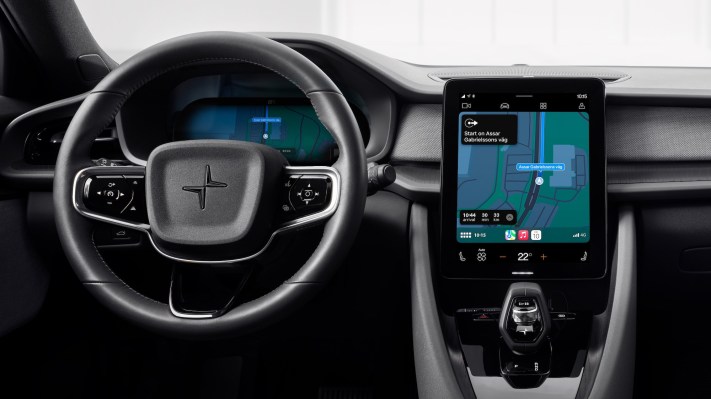
Polestar CEO Thomas Ingenlath couldn’t be happier with the integration of Google built-in, the branded product that embeds Google apps and services directly into the company’s EVs. But don’t expect the EV maker to drop Android Auto or Apple CarPlay as a result.
On the sidelines of CES 2024, Ingenlath committed to sticking with Android Auto and Apple CarPlay, the middleware that allows drivers to project their smartphone onto the car’s infotainment display. He went a step further and questioned automakers that have. GM, for instance, decided not to make the new 2024 Chevy Blazer EV compatible with Android Auto or Apple CarPlay.
“It’s still too important for our customers to have the choice,” Ingenlath said during an interview at CES 2024. He later added that, in his view, removing the option isn’t the right way of treating customers.
“Our priority is very clear; we have a really fantastic system together with Google,” he said. While Ingenlath admitted that adding that Google Built-in provides the best experience, he asked “why would we try to dogmatically educate our customers?”
Polestar has been a champion of Google built-in. However, its willingness to keep Android Auto and Apple CarPlay is notable because it illustrates the complexity of appeasing customers even if it might overshadow the native technology in the vehicle.
The so-called “Google built-in” product is powered by the tech company’s Android Automotive operating system and integrates Google automotive services directly into the vehicle. Android Automotive OS is modeled after its open source mobile operating system that runs on Linux. Instead of running smartphones, Google modified it so automakers could use it in their cars. Volvo and Polestar were among the first automakers to feature Google’s Android Automotive OS with Google built-in when it launched in 2019. As a result, the Polestar 2 and select Volvo Cars are often the first vehicles to get new apps, including YouTube, Amazon Prime video as well as new features.
Meanwhile, Android Auto and Apple CarPlay is a secondary interface that lies on top of an operating system. Android Auto and Apple CarPlay are apps that run on the user’s phone and wirelessly communicates with the vehicle’s infotainment system. And they’ve been particularly critical for automakers that have failed to offer the same features and functions that consumers have on their phones.
Automakers have been scrambling to achieve the so-called “software-defined vehicle” and have largely used Android Auto and Apple CarPlay as a stop gap. As some of their internal efforts have failed, more are taking Polestar’s approach and are adopting Google built-in instead of trying to build their own software. Nissan, Ford and Lincoln models equipped with Google built-in will also roll out this year and Porsche is expected to launch in the future.
Ingenlath seems convinced that as Google built-in improves and continues to add apps and services, consumers will give up Android Auto or Apple CarPlay on there own. And the updates do keep coming. At CES 2024, for instance, Polestar announced that the Chrome browser would start rolling out to Polestar 2 in beta, allowing drivers to surf the internet via the central vehicle display while parked. Ingenlath hinted of more improvements in the future, including more precise navigation in Google Maps that drills down to the specific lane as well as customized features designed for Polestar customers.

techcrunch.com




